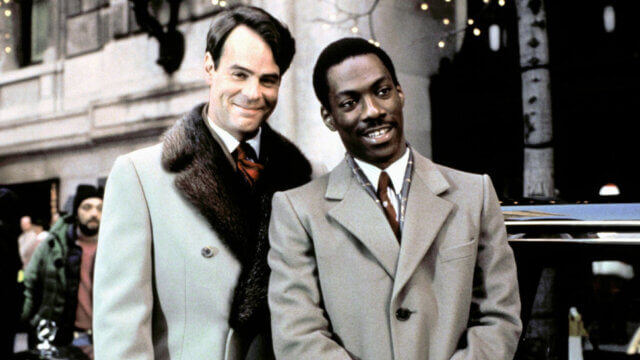So-called ‘oversupply’ in the agency market can feel like an unavoidable reality. But once you’re ready to change, the solutions are well within reach.

I don’t know about you, but I first heard of ‘commodities’ in the movie, Trading Places, which is – by some distance – the best festive film ever (sorry not sorry, fans of Die Hard). If you haven’t seen it, please stop reading and go and rectify this glaring omission. I’ll wait.
Welcome back and you’re welcome.
So, commodities – goods or services that are indistinguishable other than by price.
Why am I telling you this? Because agencies are increasingly seen as commodities – not just by clients, but also, worse still, by the people that run them.
This can’t continue without a lot of agencies disappearing. So how can you make sure yours isn’t one of them?
Our unhealthy market
Has your agency ever aimed for differentiation but ended up with buzzword bingo? Have you despaired at merciless clients eroding your margins by labelling your market as ‘oversupplied’?
This is what being commoditised feels like – indistinguishable, other than by price.
The agency business model has become fundamentally misaligned with the market. Most offer unspecialised services that clients struggle to tell apart. This creates the margin pressure that so many agency leaders are wrestling with.
Commoditisation is especially evident in new-business. Much agency marketing is so generic that it leaves clients exasperated. Fit hinges on subjective chemistry. And when conversations do progress, although clients highly value strategy and concepts, fearful agencies donate these as gifts.
Once the work is won, clients place far less value on production and distribution, making it even harder to recoup your needy upfront investment.
And when the work goes live, despite genuine client demand, agencies often lack the tools or the inclination to provide measurement and optimisation. Aside from the lost revenue opportunity, it also ensures that the legacy of their contribution is left for others to decide.
So from start to finish, this desperate, undifferentiated and self-commoditising lifecycle paints a bleak picture.
The big question is: how can you reverse out of this commercial cul-de-sac?
Reframing the problem
This was the focus of a workshop that Co:definery ran for Worldwide Partners Inc. at their global conference in Amsterdam.
WPI is a global network of independent agencies. Their members understand that being indies gives them a tangible advantage in taking decisive action on the commoditisation issue.
Our challenge to the 90 agency leaders present was to reframe the problem and create options for progress. In just one hour, we aligned on three fundamental priorities and generated a range of potential routes to explore:
How do we refine our business strategy?
- How might we apply our unique superpowers and the value our agency creates?
- how might we engage and educate procurement so they become collaborators more often?
How do we make better margins?
- How might we bill based on value, not cost?
- How might we premium-ise our offering as an agency?
How do we build agency confidence?
- How might we break the mindset of being ‘servants’ to clients and show that our time is of value?
- How might we cultivate pride in our contribution and ownership of our clients’ business success?
What’s most striking here is that this thinking isn’t revolutionary. Although applying these ideas makes a profound difference to commercial performance, many agency leaders outside this conference are still shrugging their shoulders and accepting the status quo.
So what’s stopping you?
Non-barriers to change
Perhaps the case for change is still unclear? Despite being jaded by the hamster wheel of client demands, margin pressure and finding talent, maybe you’re not convinced that change is possible?
To be frank, that’s just not good enough – life’s too short to leave your destiny to chance.
Alternatively, maybe the solutions feel too hard. Are you worried about change being disruptive – the classic ‘changing the tyres on a moving bus’? But remember businesses aren’t buses; there’s no cosy maintenance depot. You can only change while the engine’s running. Besides, changing the tyres is far better than skidding headlong into a ravine.
Seriously, can you afford to stay on your current course?
No strategy, no advantage
The fundamental issue here is strategy – or more specifically, that a huge number of agencies simply don’t have one. And that’s the root cause of commoditisation.
From fuzzy me-too propositions, to a reluctance to choose between priorities, audiences or revenue models, agencies steadfastly refuse to identify and stick to a single direction. Defining a focus is pretty much antithetical to the ruinous anything-is-possible optimism that fills agency veins.
To put it another way, if you want to stand out and command a premium through creativity, innovation and variety, then you need to maintain far healthier boundaries around the problems you solve and who you work for.
Thankfully, if you’re ready to change – as WPI’s members are – then you’re already halfway to the kind of meaningful competitive advantage that most of your rivals believe is impossible. Co:definery’s Acceleration Workshop is a powerful next step.
Without spoiling the plot, Trading Places ends with our heroes toasting their success on an idyllic tropical beach. They’ve mastered commodities and reshaped their future in just under two hours. It shouldn’t take you much longer.